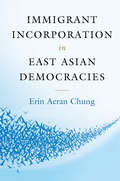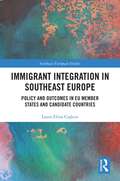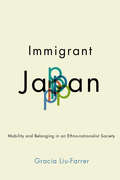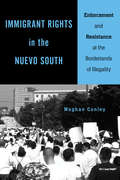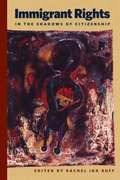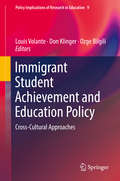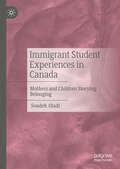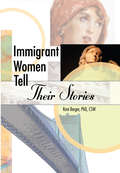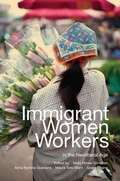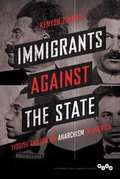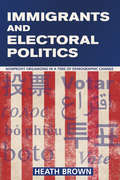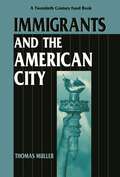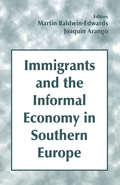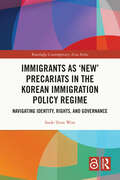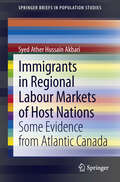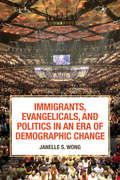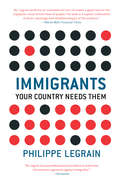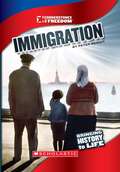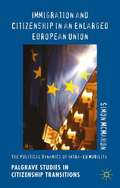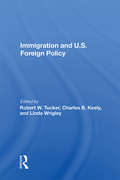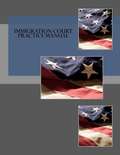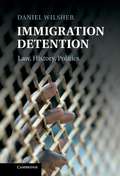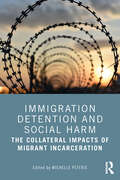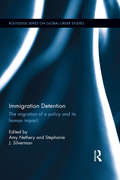- Table View
- List View
Immigrant Incorporation in East Asian Democracies
by Erin Aeran ChungDespite labour shortages and rapidly shrinking working-age populations, Japan, South Korea, and Taiwan shared restrictive immigration policies and exclusionary practices toward immigrants until the early 2000s. While Taiwan maintained this trajectory, Japan took incremental steps to expand immigrant services at the grassroots level, and South Korea enacted sweeping immigration reforms. How did convergent policies generate these divergent patterns of immigrant incorporation? Departing from the dominant scholarship that focuses on culture, domestic political elites, and international norms, this book shows the important role of civil society actors - including immigrants themselves - in giving voice to immigrant interests, mobilizing immigrant actors, and shaping public debate and policy on immigration. Based on more than 150 in-depth interviews and focus groups with over twenty immigrant communities, Immigrant Incorporation in East Asian Democracies examines how the civic legacies of past struggles for democracy shape current movements for immigrant rights and recognition.
Immigrant Integration in Southeast Europe: Policy and Outcomes in EU Member States and Candidate Countries (Southeast European Studies)
by Laura Elina CoşkunThis book presents a comparative analysis of the integration outcomes of immigrants in Southeast Europe, uncovering cross-country differences and ascertaining if they relate to the national integration policy frameworks within the context of the European Union (EU) accession.Applying a multidimensional approach to measure immigrant integration and investigating a broad range of indicators, such as employment, income, social participation, and naturalization, this book reveals that there is a large cross-country variation in immigrant integration outcomes, and some differences in outcomes can indeed be dotted along the EU’s borderlines, as gaps between immigrants and non-immigrants are especially large in member states in the region. The findings highlight the struggles EU member states in Southeast Europe face in adjusting to the more dynamic immigration landscape that EU accession brings.This book will be a valuable resource to scholars and students of immigrant integration, migration governance, European studies, and Southeast European studies, as well as those with an interest in EU enlargement and immigration policymaking.
Immigrant Japan: Mobility and Belonging in an Ethno-nationalist Society
by Gracia Liu-FarrerImmigrant Japan? Sounds like a contradiction, but as Gracia Liu-Farrer shows, millions of immigrants make their lives in Japan, dealing with the tensions between belonging and not belonging in this ethno-nationalist country. Why do people want to come to Japan? Where do immigrants with various resources and demographic profiles fit in the economic landscape? How do immigrants narrate belonging in an environment where they are "other" at a time when mobility is increasingly easy and belonging increasingly complex? Gracia Liu-Farrer illuminates the lives of these immigrants by bringing in sociological, geographical, and psychological theories—guiding the reader through life trajectories of migrants of diverse backgrounds while also going so far as to suggest that Japan is already an immigrant country.
Immigrant Rights in the Nuevo South: Enforcement and Resistance at the Borderlands of Illegality
by Meghan ConleyEvery day, undocumented immigrants are rendered vulnerable through policies and practices that illegalize them. Moreover, they are socially constructed into dangerous criminals and taxpayer burdens who are undeserving of rights, dignity, and respect. Meghan Conley’s timely book, Immigrant Rights in the Nuevo South, seeks to expose and challenge these dehumanizing ideas and practices byexamining the connections between repression and resistance for unauthorized immigrants in communities across the American Southeast. Conley uses on-the-ground interviews to describe fear and resistance from the perspective of those most affected by it. She shows how, for example, the Illegal Immigration Reform and Enforcement Act in Georgia prompted marches and an action that became “a day of non-compliance.” Likewise, an “enforcement lottery” that created unpredictable threats of arrest and deportation in the region mobilized immigrants to organize and demonstrate. However, as immigrant rights activists mobilize in opposition to the criminalization of undocumented people, they may unintentionally embrace stories of who deserves to be in the United States and who does not. Immigrant Rights in the Nuevo South explores these paradoxes while offering keen observations about the nature and power of Latinx resistance.
Immigrant Rights in the Shadows of Citizenship
by Rachel BuffPunctuated by marches across the United States in the spring of 2006, immigrant rights has reemerged as a significant and highly visible political issue. Immigrant Rights in the Shadows of U. S. Citizenship brings prominent activists and scholars together to examine the emergence and significance of the contemporary immigrant rights movement. Contributors place the contemporary immigrant rights movement in historical and comparative contexts by looking at the ways immigrants and their allies have staked claims to rights in the past, and by examining movements based in different communities around the United States. Scholars explain the evolution of immigration policy, and analyze current conflicts around issues of immigrant rights; activists engaged in the current movement document the ways in which coalitions have been built among immigrants from different nations, and between immigrant and native born peoples. The essays examine the ways in which questions of immigrant rights engage broader issues of identity, including gender, race, and sexuality.
Immigrant Student Achievement and Education Policy: Cross-cultural Approaches (Policy Implications Of Research In Education Ser. #9)
by Louis Volante Don Klinger Ozge BilgiliThis book examines immigrant student achievement and education policy across a range of Western nations. It is divided into 3 sections: Part 1 introduces the topic of immigrant student achievement and the performance disadvantage that is consistently reported across a range of international jurisdictions. Part 2 then presents national profiles from scholars in ten countries (England, Germany, Italy, Sweden, Finland, Netherlands, Republic of Ireland, Canada, Australia, and New Zealand). These educational jurisdictions were selected because they represent a range of Western nations engaged in large-scale reform efforts geared towards enhancing their immigrant students’ achievement. Each of the national profiles provides a brief overview of the evolution of the cultural composition of their respective school-aged student population; explains the trajectory of achievement results in non-immigrant and immigrant student groups in relation to both national and international large-scale assessment measures; and discusses the effectiveness of policy responses that have been adopted to close the achievement gap between non-immigrant and immigrant student populations. It also examines the relationships between education policies and immigrant student achievement and discusses how education policies have evolved across various cultural contexts. In conclusion, Part 3 analyzes cross-cultural approaches designed to address the performance disadvantage of immigrant students and proposes future areas of inquiry stemming from the national profiles. The book offers insights into a diverse cross-section of nations and policy approaches to addressing the performance disadvantage.
Immigrant Student Experiences in Canada: Mothers and Children Storying Belonging
by Soudeh OladiThis book centers immigrant children&’s school experiences as recounted and interpreted by their mothers, exposing how racialization, exclusion, and proximity to Whiteness shape their realities in Canadian schools. Drawing from Afro-Caribbean, Ghanaian, Indian, Afghan, and Chinese communities, mothers emerge as critical knowledge holders, sharing their children's stories to disrupt institutional erasure. Part One&’s two chapters reveal how Canadian schools enact symbolic multiculturalism while reinforcing linguistic conformity and Eurocentric norms, reframing identity, belonging, and home through mothers&’ stories. Part Two&’s four chapters present mothers&’ and children&’s experiences capturing subversive resistance, intergenerational tensions, trauma, invisibility, and affirmation. The concluding chapter frames storytelling as epistemic resistance, grounding immigrant families' wisdom as essential to transforming education.
Immigrant Women Tell Their Stories
by Roni Berger"I felt like an alien who fell down to earth, not understanding the rules of the game, making all the possible mistakes, saying all the wrong things." "Your whole life is in the hands of other people who do not always mean well and there is nothing you can do about it. They can decide to send you away and you have no control." "The moment I enter the house, I shelve my American self and become the 'little obedient wife' that my husband wants me to be." "The most difficult part is to find myself again. At the beginning I lost myself." This jargon-free book documents and analyzes the experience of immigration from the female perspective. It discusses the unique challenges that women face, offers insights into the meanings of their experiences, develops gender-sensitive knowledge about immigration, and discusses implications for the effective development and provision of services to immigrant women. With fascinating case studies of immigration to the United States, Australia, and Israel as well as helpful lists of relevant organizations and Web site/Internet addresses, Immigrant Women Tell Their Stories is for everyone who wants to learn or teach about immigration, especially its female face. "It was like somebody sawed my heart in two. One part remained in Cuba and one part here." Immigrant Women Tell Their Stories examines the nature of immigration for women through the eyes of those who have experienced it: how they perceive, interpret, and address the nature of the experience, its multiple aspects, the issues that it presents, and the strategies that immigrant women develop to cope with those issues. The women in this extraordinary book came from different spots around the globe, speak different languages and dialects, and their English comes in different accents. They vary in age as well as in cultural, ethnic, social, educational, and professional status. They represent a rainbow of family types and political opinions. In spite of their diversity, all these women share immigration experience. This book provides an understanding of the journeys they traveled and the experiences they lived to bring you new insights into what it means to immigrate as a woman and to frame effective strategies for working with-and for-immigrant women. "My father is the head of the house. When he decided to move to America [from India] my mother and us, the daughters, did not have much say. My mother and I were not happy at all, but it did not matter." Immigrant Women Tell Their Stories provides you with historical and global perspectives on immigration and addresses: legal, political, economic, social, and psychological dimensions of immigration and its aftermath deconstructing immigration by age, gender, and circumstances major issues of immigrant women-language, mothering, relationships and marriage, finding employment, assimilation (how much and how soon), loneliness, and more resilience in immigrant women immigration from a lesbian perspective guidelines for the development and delivery of services to immigrant women "You may say that I am the bridge, the desert generation that lost the chance to have it my way. But I will do my best to raise my daughters to have more choices than I." In this well-referenced book, immigrant women from Austria, Bosnia, Cuba, various parts of the former Soviet Union, Guatemala, India, Israel, Lebanon, Mexico, Pakistan, and the Philippines tell us their stories, recount what their experiences entailed and what challenges they posed, and teach us ways to help them cope successfully. "This was the best decision we could have made and the best thing we had ever done."
Immigrant Women Workers in the Neoliberal Age
by Grace Chang Maura Toro-Morn Anna Romina Guevarra Nilda Flores-GonzalezTo date, most research on immigrant women and labor forces has focused on the participation of immigrant women on formal labor markets. In this study, contributors focus on informal economies such as health care, domestic work, street vending, and the garment industry, where displaced and undocumented women are more likely to work. Because such informal labor markets are unregulated, many of these workers face abusive working conditions that are not reported for fear of job loss or deportation. In examining the complex dynamics of how immigrant women navigate political and economic uncertainties, this collection highlights the important role of citizenship status in defining immigrant women's opportunities, wages, and labor conditions. Contributors are Pallavi Banerjee, Grace Chang, Margaret M. Chin, Jennifer Jihye Chun, Héctor R. Cordero-Guzmán, Emir Estrada, Lucy Fisher, Nilda Flores-González, Ruth Gomberg-Munoz, Anna Romina Guevarra, Shobha Hamal Gurung, Pierrette Hondagneu-Sotelo, María de la Luz Ibarra, Miliann Kang, George Lipsitz, Lolita Andrada Lledo, Lorena Muñoz, Bandana Purkayastha, Mary Romero, Young Shin, Michelle Téllez, and Maura Toro-Morn.
Immigrants against the State: Yiddish and Italian Anarchism in America
by Kenyon ZimmerFrom the 1880s through the 1940s, tens of thousands of first- and second-generation immigrants embraced the anarchist cause after arriving on American shores. Kenyon Zimmer explores why these migrants turned to anarchism, and how their adoption of its ideology shaped their identities, experiences, and actions. Zimmer focuses on Italians and Eastern European Jews in San Francisco, New York City, and Paterson, New Jersey. Tracing the movement's changing fortunes from the pre-World War I era through the Spanish Civil War, Zimmer argues that anarchists, opposed to both American and Old World nationalism, severed all attachments to their nations of origin but also resisted assimilation into their host society. Their radical cosmopolitan outlook and identity instead embraced diversity and extended solidarity across national, ethnic, and racial divides. Though ultimately unable to withstand the onslaught of Americanism and other nationalisms, the anarchist movement nonetheless provided a shining example of a transnational collective identity delinked from the nation-state and racial hierarchies.
Immigrants and Electoral Politics: Nonprofit Organizing in a Time of Demographic Change
by Heath BrownIn Immigrants and Electoral Politics, Heath Brown shows why nonprofit electoral participation has emerged in relationship to new threats to immigrants, on one hand, and immigrant integration into U.S. society during a time of demographic change, on the other. Immigrants across the United States tend to register and vote at low rates, thereby limiting the political power of many of their communities. In an attempt to boost electoral participation through mobilization, some nonprofits adopt multifaceted political strategies including registering new voters, holding candidate forums, and phone banking to increase immigrant voter turnout. Other nonprofits opt to barely participate at all in electoral politics, preferring to advance the immigrant community by providing exclusively social services.Brown interviewed dozens of nonprofit leaders and surveyed hundreds of organizations. To capture the breadth of the immigrant experience, Brown selected organizations operating in traditional centers of immigration as well as new gateways for immigrants across the South: Florida, Illinois, Michigan, New Jersey, New York, and, North Carolina. The stories that emerge from his research include incredible successes in mobilizing immigrant communities, including organizations that registered sixty thousand new immigrant voters in New York. They also reveal efforts to suppress nonprofit voter mobilization in Florida and describe the organizational response to hate crimes directed at immigrants in Illinois.
Immigrants and the American City
by Thomas MullerAmerican immigrants are often considered symbols of hope and promise. Presidential candidates point to their immigrant roots, Ellis Island is celebrated as a national monument, and the melting pot remains a popular, if somewhat tarnished, American analogy. At the same time, images of impoverished Mexicans swarming across the Mexican-American border and boatloads of desperate Haitian and Cuban refugees depict America as a nation under siege. While governments and business interests generally welcome aliens for the economic benefits they generate, the success of these groups paradoxically stirs distrust and envy, leading to discrimination, oppression, and, in some cases, eviction. Surveying the political and economic history of American immigration, Thomas Muller compellingly argues that the clamor at America's gate should be a cause of pride, not anxiety; a sign of vigor, not an omen of decline. Illustrating that recent waves of immigration have facilitated urban renewal, Muller emphasizes the many ways in which aliens have lessened our cities' social problems rather than contributing to them. Los Angeles, New York, Miami, and San Francisco, traditional gateways to other continents, have all benefited from the contributions of immigrants. To assess perceived and actual costs of absorbing the new immigrants, Muller examines their impact on city income, housing, minority jobs, public services, and wages. But Muller argues that noneconomic concerns (such as recent attempts to formalize English as the country's official language) frequently mirror deeply-rooted fears that could explain the cyclical pattern of American attitudes toward immigrants over the last three centuries. The nation, he contends, may again be turning inward, initiating a period of growing hostility toward the foreign-born. Nonetheless, higher entry levels for skilled immigrants would improve the technological standing of the U.S., increase the standard of living for the middle class, and facilitate the resurgence of our inner cities.
Immigrants and the Informal Economy in Southern Europe
by Martin Baldwin-Edwards Joaquin ArangoIllegal immigrants constitute a major issue in southern European countries. This book is the first piece of published research in this area and gives a comparative analysis of southern European immigration policies. Detailed accounts of each country's pattern of informal immigrant employment are located within a broader setting of contemporary immigration controls.
Immigrants as ‘New’ Precariats in the Korean Immigration Policy Regime: Navigating Identity, Rights, and Governance (Routledge Contemporary Asia Series)
by Sook-Yeon WonWon explores the untold story of immigration in South Korea through a new precariat lens. Unlike traditional narratives, this book sheds light on the complexities of Korea's evolving immigration landscape, offering readers a fresh, multidimensional perspective. While its primary focus is on Korea, the text covers other countries such as Japan, the United States, Germany, Australia, and Canada. Coupled with a triadic focus, it provides a comparative analysis between Western and Asian countries, offering insights into shared experiences and unique nuances shaping immigration realities. It uncovers private realms, exploring the challenges faced by immigrants, particularly marriage migrant women, and its gendered dynamics. It also blends theories from various disciplines with rich empirical data, giving readers a comprehensive understanding of the profound implications surrounding international immigration and immigrants' experiences, not only in the Korean immigration regime but also in various types of immigration regimes. A unique read for academics, undergraduates, and postgraduates in the fields of Asian studies, public administration, immigration, political science, sociology, and comparative policy studies.Chapters 3,4, and 6 of this book is freely available as a downloadable Open Access PDF at http://www.taylorfrancis.com under a Creative Commons [Attribution-Non Commercial-No Derivatives (CC-BY-NC-ND)] 4.0 license.
Immigrants in Regional Labour Markets of Host Nations
by Syed Ather AkbariThis book is the first to present a detailed analysis of economic integration of immigrants in smaller areas of their host nations. It uses Atlantic Canada as a case in point and uses unpublished data based on several databases of Statistics Canada and Citizenship and Immigration, Canada. It identifies best policy practices that can also be used in other countries to address demographic challenges similar to those facing Canada, for example population ageing and youth out-migration from smaller regions to larger regions, through immigration. Economic integration of immigrants in Atlantic Canada is faster and better than it is nationally. An overarching result is that an analysis of regional data can lead to very different policy conclusions than the analysis of national data, which means that it can be risky to devise immigration policy based only on national data. A clear message is that economic benefits from immigration can be enhanced by facilitating a broader geographic distribution of immigrants, rather than maintaining their concentration in a few larger urban regions. A must read for immigration and population policy makers, immigrant settlement agencies and academic researchers.
Immigrants, Evangelicals, and Politics in an Era of Demographic Change
by Janelle S. WongAs immigration from Asia and Latin America reshapes the demographic composition of the U.S., some analysts have anticipated the decline of conservative white evangelicals’ influence in politics. Yet, Donald Trump captured a larger share of the white evangelical vote in the 2016 election than any candidate in the previous four presidential elections. Why has the political clout of white evangelicals persisted at a time of increased racial and ethnic diversity? In Immigrants, Evangelicals, and Politics in an Era of Demographic Change, political scientist Janelle Wong examines a new generation of Asian American and Latino evangelicals and offers an account of why demographic change has not contributed to a political realignment. Asian Americans and Latinos currently constitute 13 percent of evangelicals, and their churches are among the largest, fastest growing organizations in their communities. While evangelical identity is associated with conservative politics, Wong draws from national surveys and interviews to show that non-white evangelicals express political attitudes that are significantly less conservative than those of their white counterparts. Black, Asian American, and Latino evangelicals are much more likely to support policies such as expanded immigration rights, increased taxation of the wealthy, and government interventions to slow climate change. As Wong argues, non-white evangelicals’ experiences as members of racial or ethnic minority groups often lead them to adopt more progressive political views compared to their white counterparts. However, despite their growth in numbers, non-white evangelicals—particularly Asian Americans and Latinos—are concentrated outside of swing states, have lower levels of political participation than white evangelicals, and are less likely to be targeted by political campaigns. As a result, white evangelicals dominate the evangelical policy agenda and are overrepresented at the polls. Also, many white evangelicals have adopted even more conservative political views in response to rapid demographic change, perceiving, for example, that discrimination against Christians now rivals discrimination against racial and ethnic minorities. Wong demonstrates that immigrant evangelicals are neither “natural” Republicans nor “natural” Democrats. By examining the changing demographics of the evangelical movement, Immigrants, Evangelicals, and Politics in an Era of Demographic Change sheds light on an understudied constituency that has yet to find its political home.
Immigrants: Your Country Needs Them
by Philippe LegrainImmigration divides our globalizing world like no other issue. We are swamped by illegal immigrants and infiltrated by terrorists, our jobs stolen, our welfare system abused, our way of life destroyed--or so we are told. At a time when National Guard units are deployed alongside vigilante Minutemen on the U.S.-Mexico border, where the death toll in the past decade now exceeds 9/11's, Philippe Legrain has written the first book about immigration that looks beyond the headlines. Why are ever-rising numbers of people from poor countries arriving in the United States, Europe, and Australia? Can we keep them out? Should we even be trying? Combining compelling firsthand reporting from around the world, incisive socioeconomic analysis, and a broad understanding of what's at stake politically and culturally, Immigrants is a passionate but lucid book. In our open world, more people will inevitably move across borders, Legrain says--and we should generally welcome them. They do the jobs we can't or won't do--and their diversity enriches us all. Left and Right, free marketeers and campaigners for global justice, enlightened patriots--all should rally behind the cause of freer migration, because They need Us and We need Them.
Immigration
by Peter BenoitChronicles mass immigration to the United States from the time of the early colonies to today
Immigration And Citizenship In An Enlarged European Union
by Simon McmahonA distinctive contribution to the politics of citizenship and immigration in an expanding European Union, this book explains how and why differences arise in responses to immigration by examining local, national and transnational dimensions of public debates on Romanian migrants and the Roma minority in Italy and Spain.
Immigration And U.s. Foreign Policy
by Robert W. TuckerIn this inter disciplinary study, a distinguished group of demographers, historians, and political scientists assess the relationship between immigration and foreign policy in the United States. First re-examining the consequences of the 19th-century and inter-war migrations, the authors then explore the origins of US refugee policy and refugee mig
Immigration Court Practice Manual
by The Executive Office for Immigration ReviewThis manual is provided for the information and convenience of the general public and for parties that appear before the Immigration Courts. The manual describes procedures, requirements, and recommendations for practice before the Immigration Courts. The requirements set forth in this manual are binding on the parties who appear before the Immigration Courts, unless the Immigration Judge directs otherwise in a particular case.
Immigration Detention
by Daniel WilsherThe liberal legal ideal of protection of the individual against administrative detention without trial is embodied in the habeas corpus tradition. However, the use of detention to control immigration has gone from a wartime exception to normal practice, thus calling into question modern states' adherence to the rule of law. Daniel Wilsher traces how modern states have come to use long-term detention of immigrants without judicial control. He examines the wider emerging international human rights challenge presented by detention based upon protecting 'national sovereignty' in an age of global migration. He explores the vulnerable political status of immigrants and shows how attempts to close liberal societies can create 'unwanted persons' who are denied fundamental rights. To conclude, he proposes a set of standards to ensure that efforts to control migration, including the use of detention, conform to principles of law and uphold basic rights regardless of immigration status.
Immigration Detention and Social Harm: The Collateral Impacts of Migrant Incarceration
by Michelle PeterieThis interdisciplinary edited collection is the first internationally to comprehensively explore the harms immigration detention imposes beyond the ‘detainee’. Bringing together research from North America, the UK, Europe and Australia, it shows how the harms immigration detention imposes ramify beyond singular bodies, moments and locations – reverberating through families and communities and echoing across time.The book is structured in three parts. Part One: Human Costs, examines the harms immigration detention imposes on people who are not personally incarcerated, but whose lives are nonetheless entangled with detention regimes. Part Two: Societal Consequences highlights the corrosive impacts of immigration detention at the societal level, including the role migrant incarceration plays in naturalising and perpetuating inequalities and injustices. Part Three: Ending the Harm interrogates the possibilities of detention reform and detention abolition.This book will be a key reference text for scholars and students in the social and behavioural sciences who are interested in immigration detention, human rights and/or incarceration.
Immigration Detention: The migration of a policy and its human impact (Routledge Series on Global Order Studies)
by Amy Nethery and Stephanie J. SilvermanBefore the turn of the century, few states used immigration detention. Today, nearly every state around the world has adopted immigration detention policy in some form. States practice detention as a means to address both the accelerating numbers of people crossing their borders, and the populations residing in their states without authorisation. This edited volume examines the contemporary diffusion of immigration detention policy throughout the world and the impact of this expansion on the prospects of protection for people seeking asylum. It includes contributions by immigration detention experts working in Australasia, the Americas, Europe, Africa and the Middle East. It is the first to set out a systematic comparison of immigration detention policy across these regions and to examine how immigration detention has become a ubiquitous part of border and immigration control strategies globally. In so doing, the volume presents a global perspective on the diversity of immigration detention policies and practices, how these circumstances developed, and the human impact of states exchanging individuals’ rights to liberty for the collective assurance of border and immigration control. This text will be of key interest to scholars, students and practitioners of immigration, migration, public administration, comparative policy studies, comparative politics and international political economy.
Immigration Dialectic
by Harald BauderImmigration is an integral part of national identity in settler societies such as Canada. But in countries where identity is defined more in ethnic terms, such as Germany, the presence of immigrants has only recently begun to be acknowledged. Taking these two countries as case studies, Immigration Dialectic explores the impact of immigration on national identity as imagined through media-based discourse.Harald Bauder argues that while both countries rely on negative depictions of immigrants to construct a positive image of the self, the ways in which Canada and Germany construct national identity in relation to representations of immigrants are significantly different. Bauder introduces a sophisticated framework of Hegelian dialectics for the growing interdisciplinary literature regarding media perspectives on immigration and national identity. Providing close analysis of themes such as belonging, economic impacts, and national security, Immigration Dialectic will appeal to anyone interested in contemporary discussions on immigration.
